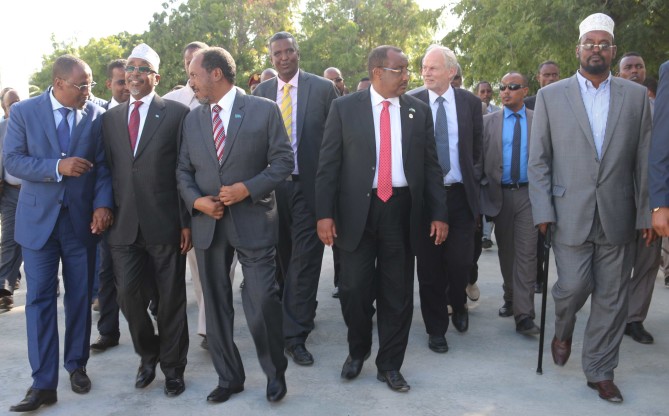Lack of unity of purpose strangled Kismayu talks, sources

Grandstanding and entrenched personal interests by leaders despite a call for compromise in the consultative process led to the collapse of the Kismayu talks, Goobjoog News can authoritatively report.
Sources close to the talks told Goobjoog News all parties in the talks held to their positions, the 4.5 clan based electoral system proponents on the one side and those in favour of the district electoral college option on the other.
Yesterday afternoon Prime Minister Abdirashid Sharmake told the nation the leaders had not agreed on anything four days after the conference opened in Kismayu.
“Personal interest defined the agenda of the talks from the start. These leaders were each pursuing their interests at the expense of the country’s greater good,” MP Mohammad Idle told Goobjoog News.
Puntland’s Abdiweli Gas and his Jubbaland counterpart Ahmed Madobe, the proponents of the district electoral college system stuck to their guns while South West leader Sharif Hassan and his Galmudug Abdikarim Guled held on to their position of 4.5.
There was a point of compromise in the talks; splitting the two options between the Upper House and the Lower House but none of the leaders could cede ground leading to the collapse of the talks, a source privy to the talks told Goobjoog News.
Sources also intimated to strong positions albeit subtly by the President, Prime Minister and Speaker.
“Of course they (PM, President and Speaker) have political interests to protect especially now as we head to the polls. President Mohamud intends to run for office in August gain. If the PM does not support his Darood clan for 4.5 where will he go to when his term expires? The Speaker naturally supports 4.5 because that is the position of his clan,” a source privy to the talks told Goobjoog News.
Idle also blamed the international community alleging that some of the envoys piled pressure on the leaders though he was not particular on the manner of pressure. “Some of the envoys were in contact with individual leaders raising concerns on what agenda they were pursuing,” said Idle.
The Kismayu conference was expected to deliver a final verdict on the electoral option for August polls but the collapse of the talks could further shatter hopes and expectation of the general public.
The UN Security Council last year indicated it would not entertain any thoughts of a term extension beyond August, a commitment which President Hassan Sheikh Mohamud has publicly declared to upheld.
The Prime Minister Sunday said the leaders will consult once more and come up with another date when they will put heads together.
Time is fast running out for the leaders as the High Level Partnership Conference slated for February in Turkey comes up where they expect to present a common front on the electoral choice.